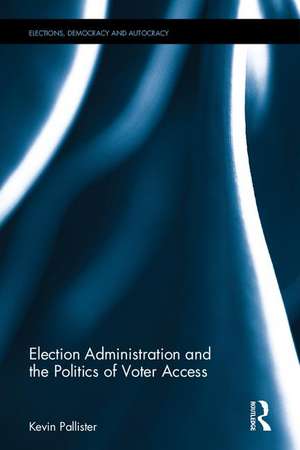Election Administration and the Politics of Voter Access: Routledge Studies in Elections, Democracy and Autocracy
Autor Kevin Pallisteren Limba Engleză Hardback – 30 mai 2017
This book is the first systematic study to investigate why it is easier to vote in some democracies than in others. It develops the concept of election administration inclusiveness, which considers all of the administrative requirements and procedures that a citizen confronts in exercising his or her right to vote. It then draws on in-depth case studies from Central America and data from Latin America more broadly to address how political parties and other actors interact in constructing election administration rules and procedures. Using a theoretical framework centred on electoral threat, party capacity, and electoral management body composition, the author identifies multiple pathways to inclusive and restrictive election administration.
This book will be of key interest to students and scholars of elections, democracy studies, Latin American politics, and more broadly comparative politics and law.
| Toate formatele și edițiile | Preț | Express |
|---|---|---|
| Paperback (1) | 412.37 lei 6-8 săpt. | |
| Taylor & Francis – 17 ian 2019 | 412.37 lei 6-8 săpt. | |
| Hardback (1) | 1002.60 lei 6-8 săpt. | |
| Taylor & Francis – 30 mai 2017 | 1002.60 lei 6-8 săpt. |
Preț: 1002.60 lei
Preț vechi: 1222.68 lei
-18% Nou
Puncte Express: 1504
Preț estimativ în valută:
191.86€ • 198.23$ • 159.60£
191.86€ • 198.23$ • 159.60£
Carte tipărită la comandă
Livrare economică 20 martie-03 aprilie
Preluare comenzi: 021 569.72.76
Specificații
ISBN-13: 9780415793179
ISBN-10: 0415793173
Pagini: 252
Ilustrații: 1 Line drawings, black and white; 11 Tables, black and white; 1 Illustrations, black and white
Dimensiuni: 156 x 234 x 20 mm
Greutate: 0.52 kg
Ediția:1
Editura: Taylor & Francis
Colecția Routledge
Seria Routledge Studies in Elections, Democracy and Autocracy
Locul publicării:Oxford, United Kingdom
ISBN-10: 0415793173
Pagini: 252
Ilustrații: 1 Line drawings, black and white; 11 Tables, black and white; 1 Illustrations, black and white
Dimensiuni: 156 x 234 x 20 mm
Greutate: 0.52 kg
Ediția:1
Editura: Taylor & Francis
Colecția Routledge
Seria Routledge Studies in Elections, Democracy and Autocracy
Locul publicării:Oxford, United Kingdom
Public țintă
Postgraduate and UndergraduateCuprins
1. Introduction
2. Election Administration Inclusiveness
3. Electoral Integrity and Inclusiveness in the Americas
4. Guatemala: Raising Obstacles to Voter Participation, 1983-2003
5. Guatemala: Election Administration Reform and Improving Voter Access, 2004-2011
6. Nicaragua: Bringing the Ballot to the People, 1984-1996
7. Nicaragua: The Slow Erosion of Inclusiveness, 2000-2012
8. El Salvador: From Voter Exclusion to Halting Reform
9. Conclusion
List of Interviews
Appendix: Recommendations from International Election Observer Missions
2. Election Administration Inclusiveness
3. Electoral Integrity and Inclusiveness in the Americas
4. Guatemala: Raising Obstacles to Voter Participation, 1983-2003
5. Guatemala: Election Administration Reform and Improving Voter Access, 2004-2011
6. Nicaragua: Bringing the Ballot to the People, 1984-1996
7. Nicaragua: The Slow Erosion of Inclusiveness, 2000-2012
8. El Salvador: From Voter Exclusion to Halting Reform
9. Conclusion
List of Interviews
Appendix: Recommendations from International Election Observer Missions
Notă biografică
Kevin Pallister is Assistant Professor of Political Science at Bridgewater College, USA. He has worked as an international election observer in Guatemala for the Organization of American States and his work has been published in the journal Latin American Politics and Society and the Routledge Handbook of Comparative Political Institutions (2015).
Descriere
This book is the first systematic study to investigate why it is easier to vote in some democracies than in others. It draws on in-depth case studies from Central America and data from Latin America more broadly to address how political parties and other actors interact in constructing election administration rules and procedures. Using a theoretical framework centred on electoral threat, party capacity, and electoral management body composition, the author identifies multiple pathways to inclusive and restrictive election administration.





